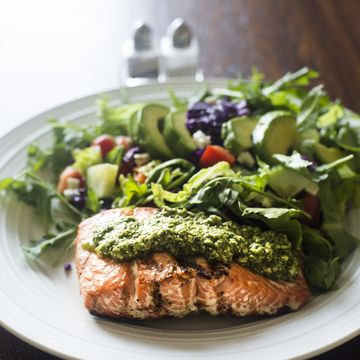Since putting a foot in your mouth never tastes very good, we're here to help. The next time you run into someone who's downsizing, bite your tongue and don't say this:
"You look great." Believe it or not, this is the worst thing you can say to a dieter. According to Brian Wansink, PhD, director of the Cornell University Food and Brand Lab, it causes people to ease up and sometimes give up. "Even though they may have much more to lose," he explains, "those words make them feel as if they've already arrived." On the flip side, offering such body-focused praise can also prompt some dieters to become obsessed with losing weight, leading to eating/exercise disorders.
Such well-intentioned comments can also hurt. When Liz Allen of Allentown, Pennsylvania, was on her way to losing 85 pounds, a friend remarked, "You're starting to look really good." Allen responded with an awkward, "Thank you," even though she was thinking, "Are you saying I looked horrible before?" The same was true for Nancy Fleming of Whitehouse Station, New Jersey, whose coworkers and friends kept telling her how attractive she looked after losing 40 pounds. "It made me want to scream, 'I'm still the same person!' "
So what should you say? Steer the conversation away from weight by focusing on other positive changes, like their happy mood or increased energy. And it's okay to acknowledge their effort, says Terese Weinstein Katz, a clinical psychologist in Northampton, Massachusetts, and author of Eat Sanely. Say, "I give you a lot of credit; weight loss is hard."
"Let me tell you about this diet that worked for me." Imagine how you would feel if, as you whipped out your credit card at the mall, a friend put a loving arm around your shoulder and said, "Let me share this great strategy for getting out of debt..." You'd be annoyed and maybe even offended, right? Well, it's the same with unsolicited dieting advice, says Rachel Weinstein, a therapist with Open Heart Space in Portland, Maine. They'll think, "I don't need you to tell me how to eat," she says. "Instead just wish them well, and keep your opinion out of it."
"Just don't eat so much." When Gay Norton Edelman of Red Bank, New Jersey, got this advice, she wanted to ask, "Do you seriously think I haven't thought of that?" If losing weight was that easy, many more people would have successfully slimmed down, says the author of The Hungry Ghost: How I Ditched 100 Pounds and Came Fully Alive. Plus, comments that include the word "just" tend to make people feel inferior, as if they're the only ones who struggle, adds Katz.
MORE: 6 Things You Have to Give Up To Lose Weight For Good
"One bite won't hurt." It's extremely difficult for anyone—even those who aren't dieting—to stop eating something delicious after tasting it, says Katz. So never treat cheesecake (or anything else for that matter) like tease cake. And what are you even doing meeting your friend for lunch at a place that offers a Never Ending Pasta Bowl when she's gone Paleo or gluten-free? That's like taking a teetotaler to happy hour. Pick a healthful restaurant or meet for coffee or, better yet, go for a walk together.
"I made this just for you." You often hear this when family becomes a little too supportive. For example, when Brooklyn food writer Debbie Koenig was losing weight, a family member unveiled a beautiful dessert and then said, "For you, I made a fruit salad." "Part of losing weight was taking charge of my decisions around food," explains Koenig, the author of Parents Need to Eat Too. "It was really counterproductive when others presumed they knew what was best for me."
It's also embarrassing to be called out in public like that. If you want to support someone who's struggling with weight issues, just ask what they need. What one person finds helpful another may not, says Sofia Rydin-Gray, PhD, director of behavioral health at the Duke University Diet and Fitness Center. Often, if it's someone you live with, they'll appreciate just having more healthful alternatives around the house.
"Are you sure you can eat that? I thought you were on a diet!" Finally, remember that you are not the food police. What someone else's weight-loss plan allows or doesn't allow isn't your concern. Even if you're watching their forearm disappear in a bag of pork rinds, mentioning the overeating will only make matters worse. "It can make someone feel like a child with a parent telling them what to do," says Rydin-Gray. Plus, it can even trigger rebellious eating, with the person continuing to indulge just to prove that, yes, she can eat this.
MORE: 12 Reasons You Just Can't Lose The Weight













